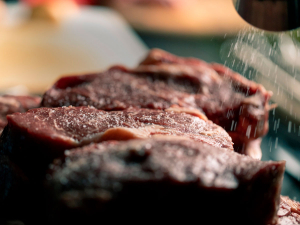Fonterra’s exit from Australia ‘a major event’
Fonterra’s impending exit from the Australian dairy industry is a major event but the story doesn’t change too much for farmers.
 High prices and contracting production in the Northern Hemisphere are opposed by lower prices and increasing production in the Southern Hemisphere.
High prices and contracting production in the Northern Hemisphere are opposed by lower prices and increasing production in the Southern Hemisphere.
Global beef markets continue to be a story of two contrasting parts.
High prices and contracting production in the Northern Hemisphere are opposed by lower prices and increasing production in the Southern Hemisphere.
That's according to Rabobank's latest Beef Quarterly Report, which shows North American cattle prices continue to track at high levels, with steady US cattle prices and a 3% quarterly rise on Canadian prices.
Meanwhile, prices remain soft in Southern Hemisphere countries, with a dramatic 28% fall in quarterly Australian cattle prices.
Meanwhile, New Zealand and Brazil also saw prices fall, but by smaller amounts.
While Southern Hemisphere production continues to increase volumes, these have not been enough to offset the declines in Europe and the US.
Rabobank says global beef production is on track to decline by 1% in 2023 and 2024 production from major producing countries is expected to remain relatively constant to expected 2023 volumes.
The report also says while overall production and consumption in 2024 is expected to remain steady.
“The US will be one of the big movers. After shifting to a net-import position in 2023, we expect production to contract a further 4.5%, while consumption drops 3% in 2024, increasing the net-import position.”
“Australia and Mexico will be the major beneficiaries, with increases in production and exports expected for both countries. New Zealand, another large supplier to the US – particularly in lean trimmings – will also benefit, but restricted production and export growth will limit the gains.”
Rabobank expects the ongoing slow global economic recovery will limit consumers’ expenditure and likely curb their spending on beef next year, as any markets – particularly in Asian countries – did not experience the growth in consumption expected as economies recovered from Covid-19.
“Indications from China are that the type of products in demand is changing, with more attention being paid to value-for-money products and less to premium ones. This consumer caution may be supported initially by reduced volumes of more expensive North American beef and increased volumes of Australian and South American beef,” the report adds.
“However, when production in the US contracts to the point where it exerts upward price pressure on global beef prices, we may see some pushback from global beef consumers. It is possible that 2024 will see margins in beef supply chains being squeezed to manage higher prices and accommodate the consumer.”
The Meat Industry Association of New Zealand (MIA) today announced that Chief Executive Officer Sirma Karapeeva has resigned from the role.
The winners of the 2026 Hawke’s Bay/Wairarapa Dairy Industry Awards were announced at the annual awards dinner held at Copthorne Solway Park in Masterton on Thursday evening.
Environment Southland is welcoming this week’s decision by the Environmental Protection Authority (EPA) to approve the release of Blaptea elguetai, a leaf‑feeding beetle that will help control the highly invasive Chilean flame creeper.
This March, the potato industry is proudly celebrating International Women’s Day on 8 March alongside the International Year of the Woman Farmer, recognising the vital role women play across every part of the sector — from paddocks and packhouses to research, leadership, and innovation.
Fruit trader Seeka posted a record profit and returns to shareholders in 2025.
Recent weather events in the Bay of Plenty, Gisborne/Tairawhiti, and Canterbury have been declared a medium-scale adverse event.

OPINION: A mate of yours truly reckons rural Manawatu families are the latest to suffer under what he calls the…
OPINION: If old Winston Peters thinks building trade relations with new nations, such as India, isn't a necessary investment in…